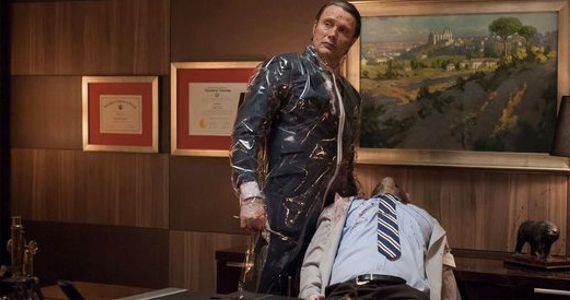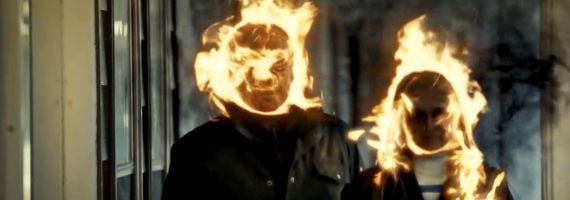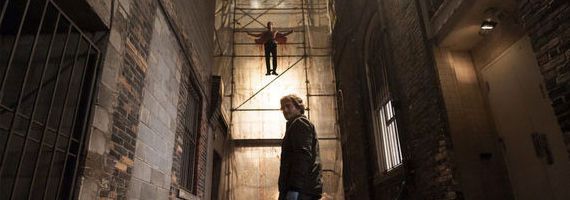In just 10 episodes, Bryan Fuller's Hannibal has surprised many by proving itself to be one of the most compelling and richly-rewarding series on television at the moment. In fact, it likely ranks right up there with The Americans as one of the best new dramas to appear on television so far this year (and the fact that it's on NBC makes it even more mind-boggling).
And while taut storytelling, well-crafted characters and cinematic visuals are what separates these series from lesser entries that are new to our screens in 2013, what makes Hannibal unique is its pervasive dream logic and an unwillingness to be confined by the rules or conventions adhered to by the kind of program it most closely resembles.
Hannibal is, for the most part, a crime procedural, meaning week-in and week-out, there is a specific crime that is usually discovered and resolved within a single episode's timeframe. However, the conceit of the series isn't to make it just a killer-of-the-week drama in which the heroes apprehend the villain and then go back to their nondescript (or nonexistent) home life - as though they hadn't just spent an extended amount of exploring the absolute worst of what human nature has to offer. Hannibal instead depicts the emotionally corrosive effect these crimes have on the essentially good people who have made it their mission in life to stop these killers from striking again and ruining the lives of more innocent people.
Rather than play up familiar tropes and clichés, Bryan Fuller and the rest of his Hannibal crew – which has so far included the talents of David Slade, James Foley and John Dahl, to much success – have chosen to play up the caustic consequences of these investigations with a helping of deeply symbolic imagery and a lengthy examination of the series' protagonist's state of mind.
To make this more effective, Hannibal utilizes Will Graham's psychological deterioration as the foundation on which it offers the story to the viewer. Although there are plenty of (more or less) sane characters surrounding Will, the narrative is presented primarily through the radically different and sometimes unreliable filter of his mind. Scenes seem to jump wildly in time and location, while characters seem to manifestin the most peculiar and convenient of places. The result of this, then, is certain story elements play out with a skewed, dream-like logic that rather than being unquestioningly devoted to producing an airtight plot, serves instead to inform on the characters in a way that is more emotionally satisfying than your typical procedural drama.
This focus on character means the series is more interested in the repercussions of the crime and the parallels that are drawn between the two sides of the investigation, rather than an examination or graphic depiction of the violence itself. During last week's 'Trou Normand,' there was some dismay expressed in the comment section regarding what appeared to be the marginalization of the killer played by Lance Henriksen. While Henriksen only had a single scene, it seemed to me that the character was intended less as a way to progress the plot, and more a way of coloring the characters and how they view their work, their legacy and, ultimately, what impact they will have had on the world when their time is up.
Henriksen's character was practically nonexistent; he was deliberately insubstantial in a way that made his appearance feel almost like a hallucination, and that nightmarish quality helped make his gruesome tableau all the more traumatic and haunting.
In that sense, there has also been a lot of debate around the series' depiction of various killers and the horrific, yet fascinating crime scenes they leave behind. Much of the deliberation has revolved around whether or not these elaborate and complex tableaus could be pulled off at all, let alone by a single person.
These questions started swirling around the fifth episode, 'Coquilles,' which saw a man with a brain tumor peeling the skin off his victims' backs, transforming them into grotesque angel-like statues. One of his victims was suspended from some scaffolding, nearly a story high. Then, last week, Lance Henriksen's character constructed a sizeable totem pole consisting of dozens of dead bodies, causing many to wonder just how such a scene could be constructed, by a man in his seventies no less.
I'm not sure why that matters so much, or if it even matters at all. Hannibal is a highly-stylized show that uses genre elements in an incredibly specific and detailed way. The series may have a procedural in its blood, and an intriguing ongoing serial component about essentially "real" people - but, as far as I can tell, it's not intended to be grounded in some firm sense of our reality.
Hannibal is successful because it adheres primarily to a dream-logic; things make sense because they're presented to the viewer in such a way that they only work within the confines of the story at hand. Take what you see in an episode outside the context of the series and it naturally begins to break down, like scrutinizing a dream upon waking. The show operates on a skewed perspective, a bent reasoning that's more like a walking through a nightmare than spending time in the world of a hard-and-fast cop-drama. This makes it unique and rare, and that's one of the many reasons people are drawn to it.
So, to ask that the killers suddenly adhere more to the laws of our existence would be to rob a wonderfully dark, twisted and imaginative series of the essence which made it so special in the first place. You tell me Lance Henriksen built a totem pole out of dead bodies on any other show and I'll scoff; but if Hannibal tells me Lance Henriksen built a totem pole out of dead bodies, then I'll say, "Of course he did."
Crime procedurals are a dime a dozen, and if standing out means Hannibal adheres to a set of rules that only apply to its distinctive dream-logic, then so be it; the procedural genre and television as a whole are better off because of this series' unwillingness to play by the rules.
_____
Hannibal airs Thursday nights @10pm on NBC.




